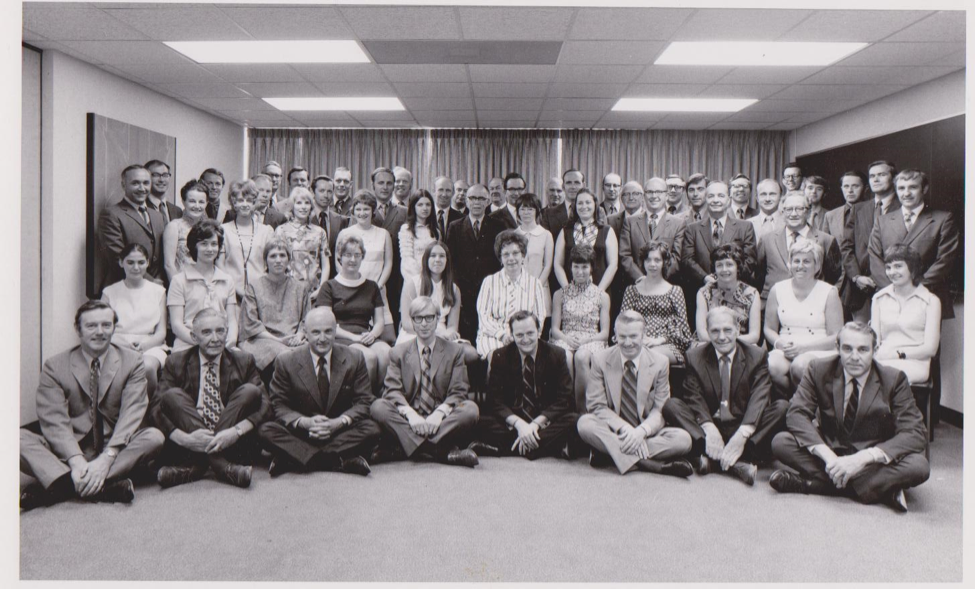Editor:
Brandon Sweet
University Communications
bulletin@uwaterloo.ca
60 years of co-op at Waterloo

Career Services department staff in the newly built Needles Hall (1972).
By Naz Kittani.
What does 60 years of co-op look like at the University of Waterloo?
What started with a cohort of 74 students in 1957 has grown to more than 20,000 today. Initially only for engineering students, co-op is now available in 120 programs across all six faculties. It is the reason 70 percent of incoming undergraduate students choose Waterloo.
As the co-op program grew over the years, more resources were needed to support it. In 2002, after three decades in Needles Hall, the co-op department moved to the newly built William M. Tatham Centre. The three-level building was named in recognition of the generous support of William Tatham, a former Waterloo co-op student whose first company sold for $1.76 billion. The building is dedicated solely to supporting co-operative education and career action. It houses 120+ interview rooms and a state-of-the-art paging system to maximize the efficiency of co-op hiring process.
And the co-op program hasn’t stopped growing. Last year, more than one million job applications were submitted by students as they competed for jobs posted in Waterloo’s employment administration system. A team of 180+ full-time and contract staff helped facilitate the process including a schedule of more than 59,000 interviews (in-person, phone, and online). While most of the staff is located on campus, Waterloo is unique in that its co-op support teams are located across Canada to help employers and students navigate their work terms.
Today, industry leaders from all over the globe seek out talent from Waterloo, with 6,700 active employers in more than 60 countries. In fact, this year Waterloo was ranked #1 in the world for employer partnerships (Quacquerelli Symonds Graduate Employability Rankings 2017). The sought-after talent of Waterloo co-op students has been credited with helping make the Toronto-Waterloo innovation corridor as a key startup scene to watch.
Looking back on its humble beginnings, it should be no surprise that co-op has grown so exponentially at Canada’s most innovative university – after all, it’s the innovation the University of Waterloo was founded on. What innovations will the next 60 years of co-op bring?
To read more about Waterloo in the past 60 years, visit the official 60th Anniversary website.
Quantum physics for babies...and you

This article originally appeared on Waterloo Stories.
In a recent survey, nearly 1 in 3 Americans said they would rather clean a toilet than do a single math problem.
“Tell someone on the street that you are a physicist, or worse, a mathematician, and you’ll be acknowledged with a ‘I hated math in school’ or ‘I was never any good at math.’ Tell them you are a quantum physicist and you’ll be lucky if you get a response,” says Chris Ferrie, a quantum theorist and author of Quantum Physics for Babies, a children’s book gaining in popularity after being endorsed by Facebook co-founder and CEO Mark Zuckerberg.
So what is it about math and physics that creates doubt and avoidance among so many people? If it’s the fear of the unfamiliar, Ferrie, a University of Waterloo mathematics alumnus, plans to eliminate it by introducing children to quantum physics.
Ferrie, also an alumnus of the Institute for Quantum Computing (IQC), returns to the University of Waterloo on Friday August 18 to share his experience communicating a complex topic to a general audience. Learn how he has used his books as a platform to encourage science literacy and to share quantum physics with a wider audience.
“I want quantum physics, indeed all physics and math and science, to be normal for a child to take interest in,” said Ferrie. While his books, which also include titles like Quantum Entanglement for Babies and General Relativity for Babies, are exposing young kids to the language and concepts of these topics, it turns out that parents are learning, too.
There's still time to register for this special seminar that takes place on Friday, August 18 at 1:00 p.m. in QNC 1502.
Link of the day
20 years ago: South Park debuts at rock bottom - and starts digging
When and where
Quantum Cryptography School for Young Students, Friday, August 11 to Friday, August 18.
Ontario Mennonite Music Camp, Sunday, August 13 to Friday, August 25, Conrad Grebel University College.
IQC special seminar, "Chris Ferrie: Quantum Physics for Babies," Friday, August 18, 1:00 p.m., Mike & Ophelia Lazaridis Quantum-Nano Centre, Room 1502. Free registration.
Partial Solar Eclipse Viewing, Monday August 21, 1:00 p.m. to 4:00 p.m., Village 1 Green. Registration required to get eclipse glasses.
Computer Science seminar, “Network heartbeat traffic characterization,” Carey Williamson, University of Calgary, Monday, August 21, 2:30 p.m. to 3:30 p.m., DC 1331.
Retirement reception for Sgt. Peter Speek, Tuesday, August 22, 4:00 p.m., Federation Hall. RSVP to Alan Binns at ambinns@uwaterloo.ca.
Deadline for students to get “Fees Arranged,” Wednesday, August 23.
PhD Seminar featuring Kathryn Jastremski, Thursday August 24, 1:30 p.m., EV2-2022.
10th Annual St. Paul's Golf Tournament, Friday, August 25, 7:30 a.m. to 4:00 p.m., Glen Eagle Golf Club.
PhD seminar, “Projection free rank-drop steps,” Edward Cheung, David R. Cheriton School of Computer Science, Thursday, August 31, 2:00 p.m. to 3:00 p.m., DC 2310.
Fall Orientation, Sunday, September 3 to Saturday, September 9.
Fall Move-in begins, Sunday, September 3.
Labour Day, most University services and buildings closed, Monday, September 4.
Co-operative work term begins, Tuesday, September 5.
LGBTQ+ Making Spaces workshop, Tuesday, September 5, 12:30 p.m., NH 3318. Please register- Seating is limited.
WaterTalk: Data instead of concrete? Exploring the potential of digitalization in urban drainage, featuring Professor Max Maurer, Tuesday, September 5, 2:30 p.m., DC 1302.
Lectures begin, Thursday, September 7.
Feds Welcome Week, Monday, September 11 to Friday, September 15.
President and Senior Staff Luncheon, Monday, September 11, 12:00 p.m., Davis Centre Quad.
The Water Institute RBC Distinguished Lecture 2017 featuring Quentin Grafton, “Innovation, Incentives and Infrastructure in the Blue Economy,” Monday, September 11, 3:40 p.m., Crowne Plaza Grand Ballroom, Kitchener.
Waterloo Innovation Summit - Hacking the Future, Thursday, September 14 and Friday, September 15.
Deadline to submit nominations for the President's Community Impact Awards, Friday, September 15.
WaterTalk: Emerging Outcomes From a Cross-Disciplinary Doctoral Programme on Water Resource Systems, Friday, September 15, 2:30 p.m., DC 1302.